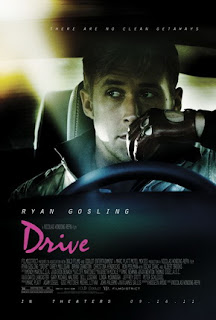The Django Unchained trailer really covers the basics. Like so many other Tarantino movies --- Kill Bill, especially --- the premise is fairly simple. A bounty hunter in pre-American Civil War times, Dr. King Schultz (Christoph Waltz), enlists a slave, Django (Jamie Foxx) to help him out on a bounty assignment. As it turns out, Django is a natural when it comes to killing people. What a happy coincidence! Working with Schultz allows Django to earn his freedom, but his ultimate goal is to find his wife. He doesn't know who owns her, but Schultz agrees to help his new friend find his lost love. Of course, there are some twists and turns down that road, usually involving racist white people and gore, but that sums things up pretty nicely.
 |
| Okay, there are bad black guys, too. It's a complex film. |
It's a good thing that I feel silly summarizing the plot in detail, because I have a lot to say about everything else in Django Unchained. While I have some concerns about Tarantino's writing and direction, the man has a knack for getting great work from his actors. I honestly think this is my favorite performance by Jamie Foxx --- of course, if you don't count Ray or Collateral, there's not much competition. He was understated at times, but was able to rise to whatever level of silliness or violence the script demanded.
 |
| Violence and a silly suit --- in the same scene! Levels! |
 |
| He doesn't need the hammer here. With that grin, even flowers would look threatening |
That is not the look of a slave. That is the look of an evil bastard who loves to manipulate, and that is why this was a standout role for Jackson. Like most Tarantino movies, the cast is substantially large, but those four are the major players. Kerry Washington was fine as Django's wife, but her role was reactionary, so it was hard to like much about her. Don Johnson had a better part, as one of the many racist white people that needed killing, but it's not like he had to do much in his role. Walton Goggins made a welcome appearance as a henchman. Goggins is quickly becoming one of my favorite villains, thanks to his work in Justified, but his caveman-brow and so-laid-back-it's-sinister Southern drawl make him a scene-stealer regardless of his medium. Here, he played tough very well (as expected) and gave a truly fantastic frightened howl (less expected). I'm not exactly sure why James Remar had a dual role, since his characters were never revealed to be brothers, but it's nice to see him get back to his bad guy roots, instead of all this bland authority figure crap he's been putting out lately. The rest of the cast was essentially a series of cameos. The ones that paid off fairly well were Jonah Hill, M.C. Gainey, and Bruce Dern; none of them did anything special, but they played their familiar parts well enough. The rest were surprisingly brief. Amber Tamblyn looked out a window, Franco Nero was there to pass on the legend (he was the original Django), and Ato Essandoh died poorly.
And then there is the hillbilly family, which consisted of Tom Savini, Robert Carradine, Zoe Bell, and Ted "Jesus Christ Superstar" Neeley, among others. I don't know if they had a line between them. Of course, Quentin Tarantino had to cast himself in a small role. While his Australian accent was horrible, his character's fate was hilarious, so I'm counting this as one of his better bit roles.
Quentin Tarantino wrote and directed Django Unchained, and it is definitely a Quentin Tarantino movie. If you don't already like his fast-talking and (occasionally) brutally gory films, Django will not change your mind. Similarly, if you're already on board with Tarantino, I can't imagine Django disappointing. In terms of dialogue, there are more than enough actors here that are capable of delivering QT's lines well. Pairing Waltz and Jackson in the same film --- even though they didn't interact much --- was a lot of fun to watch, because you can tell that their dialogue was written specifically for them.
 |
| "What can I say? I'm his muse." |
Since this is a Western and a Quentin Tarantino film, I should probably take a moment to address the level of gore and violence in Django Unchained. Simply put, it is awesome and abundant.
 |
| ...and this is only a small taste of the exploding blood packs in this film |
 |
| To put it another way, *slowly licks Leo's hand* |
 |
| This still alone is better than American Outlaws |
There are three problems I have with Django Unchained. The first is that the movie is too damn long. Tarantino loves to hear himself talk, so I suppose it is no surprise that he can't seem to cut out much from his films. That's not a huge problem, but this story could have been twenty or thirty minutes shorter and still been awesome.
 |
| He could have cut the scenes where they shopped for drapes, for example |
Are any of those issues critical flaws? Not for me, although the last one still bothers me, even days after watching it. Django Unchained does so many things right that its missteps barely matter. And I haven't even mentioned the amazing soundtrack! Ennio Morricone. Western. 'Nuff said. I went into this with extremely high expectations, and I loved every minute of it. The violence was ample, the dialogue was funny and clever, and the villains (especially Sam Jackson) had depth. It's not perfect, but I find the imperfections pleasantly interesting.
Here's the song from the opening credits, which also happens to have been the song from the original Franco Nero Django:










































